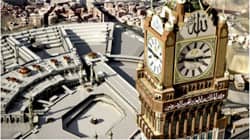Note: The following is reprinted with permission from Religion Dispatches. You can sign up for their free daily newsletter here.
 This summer, the world's largest clock began its first official duty: marking time during Ramadan in Mecca—Islam's holiest city. This colossal clock bears a striking resemblance to Big Ben, and the tower that hosts it (courtesy of the Canadian-based Fairmont hotel operation) is six times taller than the British landmark, making it the second tallest building in the world, visible for 16 miles.
This summer, the world's largest clock began its first official duty: marking time during Ramadan in Mecca—Islam's holiest city. This colossal clock bears a striking resemblance to Big Ben, and the tower that hosts it (courtesy of the Canadian-based Fairmont hotel operation) is six times taller than the British landmark, making it the second tallest building in the world, visible for 16 miles.
All well and good. One can marvel at human ingenuity and move on. However, what makes this case interesting is the fact that after the inauguration of the clock, there were calls from many Muslims to replace Greenwich Mean Time (GMT)—the world standard for 125 years—with Mecca Time. Some have argued that GMT is the remnant of a colonial heritage, and it is time to turn over a new page.
Surely, there is nothing special about where the Greenwich Observatory is located. The reason that the meridian is zero at Greenwich is because the British figured out how to calculate longitude at sea first, so they got to make a part of England the main reference point. Names associated with science are often, if not always, symptomatic of political power of the time. This is why many of the elements discovered in the 20th century—like berkelium, americium, and californium—have American names (though sometimes there were competing claims from Soviet laboratories also). Similarly, because Arab astronomy was dominant in the late medieval period, and Arabic atlases played a key role in the development of modern astronomy, more than half of the brightest stars in the sky have Arabic names. But for some Muslims today, that's not enough.
Even if we concede the colonial legacy of GMT, what would justify Mecca to be the replacement reference point for the entire world?
Things start to get messy pretty fast. There is now a widespread belief amongst Muslims that one can prove "scientifically" that Mecca is really the true "center of the world." This line of reasoning has been heavily promoted and popularized by a prominent Egyptian cleric, Sheikh Youssef al-Qaradawy, who claims that, unlike other longitudes, Mecca is in perfect alignment with the north magnetic pole. Some Arab scientists have also lent their authority to these claims. For example, Abdel-Baset al-Sayeed of the Egyptian National Research Centre claims that Mecca is a "zero-magnetism zone." In fact, he goes on to say, "That's why if someone travels to Mecca or lives there, he lives longer, is healthier, and is less affected by the earth's gravity. You get charged with energy."
All of these claims are complete bunk. For example, even if one assumes that there is a special alignment with the northern magnetic field, the position of the magnetic north changes every year. It is currently in northern Canada and moving towards Russia at 40 miles per year. (The magnetic south pole is also moving in Antarctica.) So unless one wants to move Mecca at a similar speed, it may have a hard time keeping whatever alignment Youssef al-Qaradawy is talking about.
The urge on the part of some to show Mecca's specialness in a scientific idiom has nothing to do with actual science. There is a whole genre in the Muslim world of claims that modern science is already in the Qur'an (such as modern embryology, the expanding universe, etc.), thus "verifying" the holy text's truth. The claim that Mecca is the center of the world falls in this same unfortunate category. What is interesting here is the desire to use science (indeed, really bad science) as an instrument to verify religion. While it's not unique to Muslims by any means, such ideas today are very popular in the Muslim world, which is still nostalgic about the golden age when it was literally naming the heavens.
The emotional appeal of such ideas, and the backing of some Muslim scientists, makes it very hard to challenge them. Such a challenge can only come from within the Muslim world, as any other approach will directly feed into the resurgent anti-Western narrative, which unfortunately the Western media often only reinforces. For example, the Daily Telegraph ended its story on the calls to adopt Mecca Time and the geological uniqueness of Mecca with the following disclaimer: "Western scientists have challenged such assertions, noting that the Magnetic North Pole is in actual fact on a line of longitude that passes through Canada, the United States, Mexico, and Antarctica." The problem here is the qualifier, "Western" before scientists. Virtually all respectable scientists, Western or non-Western, would agree with the above statement, including many Muslim scientists. But by adding "Western" before "scientists," the sentence creates an impression of a clash between Muslims—clinging to pseudoscientific ideas—and the rational West.




